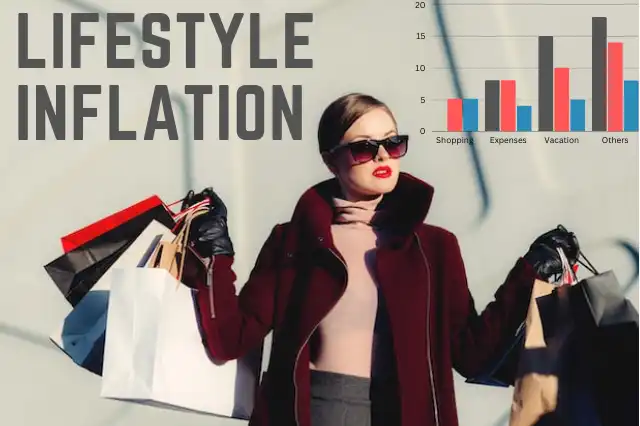Managing your personal finances is an important task. However, lifestyle inflation can make it more difficult to keep your finances on track. In this article, you will know more about how to avoid lifestyle inflation.

What is Lifestyle Inflation
Lifestyle Inflation, simply put is the urge and tendency of people to spend more as they earn more.
It refers to an increase in spending (habits) when an individual’s income/earnings go up. Generally, it happens when you allow your spending to gradually increase over time by desiring a more luxurious lifestyle as you earn more and more.
By getting a pay raise you would normally feel like upgrading your lifestyle and spending more on daily necessities and even more so on lifestyles.
Income and spending are positively correlated—meaning as income increases, so do spend. Conversely, lifestyle deflation refers to a reduction in spending.
Examples of Lifestyle Inflation
Say in the initial days of your university, you used to do some odd jobs here and there and save some cash to make ends meet. You shared a three-bedroom apartment off-campus with other students, eat some sandwiches and noodles, barely went out, and merely just balancing your daily expenses.
Now, after graduation, you got a high-paying job, moved out of campus, and got yourself a studio apartment in some big city. You now pay more rent, eat often outdoors, joined the gym got yourself a four-wheeler and started enjoying some luxurious lifestyle and extravagances.
This is a typical real-life scenario and an example of lifestyle inflation.
How does it affect you?
People often tend to increase their spending when their income rises because they believe that the additional goods and services they buy now, will make them happier.
Often those purchases don’t actually make them happier. Instead, it just causes Lifestyle Inflation and subsequently, people get stuck in a never-ending cycle of living paycheck to paycheck where they have just enough money to pay the bills every month.
Also, it can make it difficult to get out of debt, save for retirement, or meet other big-picture financial goals.
How To Avoid Lifestyle Inflation
A better option would be to work toward financial independence by saving more. Being mindful of your spending habits is the key to avoiding lifestyle creep.
Here are a few of the measures to enhance your lifestyle after a rise in income.
1. Being Aware of Your Spending Habits and Choices
The first step is understanding that lifestyle inflation is a real threat. Unfortunately, it is very easy for lifestyle inflation to sneak up on you because it often starts with small choices. With time, small spending choices can add up and compound up to a very expensive lifestyle.
As you make decisions surrounding your budget, consider the threat of spending more. When you are thinking about adding a new expense to your life, think about the reasons behind the expense.
Is it an essential item? Or will it contribute to lifestyle creep without adding a significant amount of happiness to your life?
2. Set a Budget Plan
The key to winning with money is simple: Budgeting!
One of the ways to avoid lifestyle inflation is simply having a budget plan or monthly cash flow plan. Knowing where your income goes each month gives you insight into how you’re spending money and what you value as well.
Budgeting on your necessities and putting a limit on your luxuries is the first and foremost thing to control Lifestyle Inflation.
3. Wait on Impulse Purchases
We have a tendency to impulse buy on Online Store Sales, Discount Offers, Black Friday Sales, or any other discount coupon schemes. We do that just out of adrenaline rush just because they were on sale and discounted offers.
Some of those purchases you wouldn’t make if you were earning less money. If you have this habit, then you should use these tips for resisting the urge to buy unnecessary items:
- Establish a waiting period for all impulse purchases; even 24 hours can help curb the desire to buy something you don’t need.
- Audit your non-budgeted spending every year to help you see how much money you spent on impulse purchases.
Note: Knowing the difference between your wants and needs is crucial to curbing lifestyle creep.
Check Out your Credit Report: Get your free credit score
4. Don’t take a new debt just ‘coz you can “afford it
You might have heard someone say, “I just got a raise at work… now I can afford that new car (house, furniture, vacation, etc.)?
Just ‘coz you can doesn’t mean you should. It can wait. They might not be truly affordable. Piling up debt for your extravagances is a red flag to your financial independence. The interest could make you pay far more than the original price and for more time.
5. Save or Pay Off Debts First
Although it may be tempting to splurge after a pay raise, it’s best to consider your financial goals. You don’t want to be spending all your earnings/paychecks on spending, luxuries, recreation, entertainment, and paying off the debt each month.
Think about financial planning and financial independence. You do not want to be hung up with the debt and pay off the debt cycle.
The best advice here would be to put all of a new raise directly into savings, paying off debt, or other long-term financial goals.
Read More: Good Debt vs Bad Debt: The Difference
Key Takeaways
- Lifestyle inflation is when people upgrade their lifestyles upon earning a higher income.
- Lifestyle inflation can increase a person’s debt-to-income ratio and lead to over-indebtedness.
- Experts recommend setting a budget and contributing to savings and retirement accounts to combat lifestyle inflation.
Frequently Asked Questions
What causes lifestyle inflation?
Simply put, lifestyle inflation happens when you increase your urge and tendency to spend more on household spending as you earn more.
What are examples of Lifestyle Inflation?
Simple put examples of lifestyle inflation:
1. Upgrading your living standards.
2. Buying out the latest new phones & cars when the old ones work fine.
3. Buying more branded clothes, and foods.
4. Frequent Outings and Outdoor Eating in Restaurants.
5. Online Shopping
6. Frequent Vacations
The Bottom Line
Lastly, lifestyle inflation can easily slip up on you if you let it. It might start with a simple lifestyle upgrade but it could quickly turn into an expensive lifestyle that you can barely afford.
And if you do not be careful and put the brakes on spending on extravagances, you will soon and surely keep moving in the vicious cycle of living paycheck to paycheck, making the minimum payments on your credit cards and debt.


